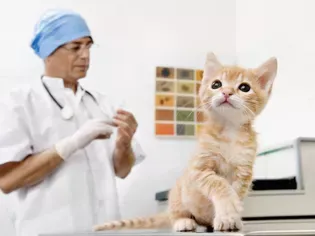The Debate Around the FIV Vaccine for Cats
Updated on 04/26/24

The Feline Immunodeficiency Virus (FIV) Vaccine: Unraveling the Debate
The emergence of the Feline Immunodeficiency Virus (FIV) vaccine has stirred up a heated debate within the veterinary community. With varying opinions and conflicting information, navigating the pros and cons can be daunting for cat owners. In this comprehensive blog, we delve into the intricate world of the FIV vaccine, providing you with a comprehensive analysis of its benefits, risks, and implications. Join us as we embark on a journey to empower you with the knowledge to make informed decisions regarding your feline companion's health.
Understanding FIV: The Basics
FIV, a retrovirus, is closely related to the human immunodeficiency virus (HIV). It primarily affects cats, impairing their immune systems and leaving them vulnerable to opportunistic infections. The virus is predominantly transmitted through bite wounds during aggressive interactions between cats, making it prevalent in outdoor and feral cat populations.
The FIV Vaccine: A Glimmer of Hope
The development of the FIV vaccine has ignited hope in the fight against this debilitating virus. The vaccine, administered as a series of injections, aims to stimulate the cat's immune system to produce antibodies against FIV. These antibodies can neutralize the virus, preventing infection or reducing its severity.
Benefits of Vaccination: A Shield for Your Feline Friend
* Protection from Infection: The FIV vaccine offers significant protection against contracting the virus. Studies have shown that vaccinated cats are far less likely to develop FIV after exposure to infected cats.
* Reduced Disease Severity: Even if a vaccinated cat contracts FIV, the vaccination can mitigate the severity of the disease. Vaccinated cats typically experience milder symptoms and a longer life expectancy compared to unvaccinated cats.
* Diminished Viral Shedding: Vaccinated cats shed less FIV in their saliva, reducing the risk of transmission to other cats. This is particularly crucial in multi-cat households or communities with high FIV prevalence.
Risks of Vaccination: Weighing the Potential Downsides
* Possible Side Effects: As with any vaccine, the FIV vaccine can cause mild side effects, such as injection site reactions, lethargy, and loss of appetite. These side effects are typically transient and resolve within a few days.
* Ineffectiveness Against Existing Infections: The FIV vaccine is only effective if administered before a cat is infected. It cannot cure or treat cats that have already contracted the virus.
* Potential for Interference with Other Vaccines: The FIV vaccine may interfere with the effectiveness of other vaccines administered around the same time. Consult with your veterinarian to determine the optimal vaccination schedule.
Deciding Whether to Vaccinate: A Personalized Approach
The decision of whether to vaccinate your cat against FIV requires careful consideration of several factors:
* Risk of Exposure: Cats with a high risk of exposure to FIV, such as outdoor cats and those living in areas with a high prevalence of the virus, should be strongly considered for vaccination.
* Age and Health Status: Kittens and cats with weakened immune systems may benefit more from vaccination due to their increased susceptibility to FIV.
* Other Vaccines: Ensure that your cat is up-to-date on other essential vaccines before considering the FIV vaccine.
* Veterinary Recommendation: Consult with your veterinarian to assess your cat's individual needs and determine if the FIV vaccine is appropriate.
Additional Measures to Protect Your Cat from FIV
Vaccination is a powerful tool, but it's not the only measure you can take to protect your cat from FIV:
* Keep Cats Indoors: Outdoor cats are at a higher risk of exposure to FIV due to contact with other cats. Keeping your cat indoors reduces the chances of infection.
* Minimize Fighting: Aggressive interactions between cats can lead to bite wounds and potential FIV transmission. Neutering or spaying your cat can reduce aggression.
* Test New Cats: Before introducing a new cat into your household, have them tested for FIV to prevent potential transmission.
Conclusion: Empowering Informed Decisions
The FIV vaccine is a valuable tool in the fight against Feline Immunodeficiency Virus. While it offers significant benefits, it also comes with potential risks. Understanding the complexities of the vaccine and its implications is crucial for making informed decisions about your cat's health. By weighing the pros and cons, assessing your cat's individual risk factors, and consulting with your veterinarian, you can determine whether the FIV vaccine is the right choice for your feline companion. Remember, the ultimate goal is to provide your cat with the best possible protection against this debilitating virus.
Explore More Pets

Cat Behavior Problems
How to Stop Aggression in Kittens

Long-Haired Cat Breeds
Siberian Cat: Breed Profile, Characteristics, & Care

Cat Behavior Problems
How to Stop Kittens From Scratching and Biting

Long-Haired Cat Breeds
Turkish Angora: Cat Breed Profile, Characteristics & Care

Basic Training
How to Socialize Your Kitten

Short-Haired Cat Breeds
Cute Pictures & Facts About Calico Cats & Kittens

Litter Box Training
Training Your Kitten to Use the Litter Box

Long-Haired Cat Breeds
10 Fun Facts About White Cats